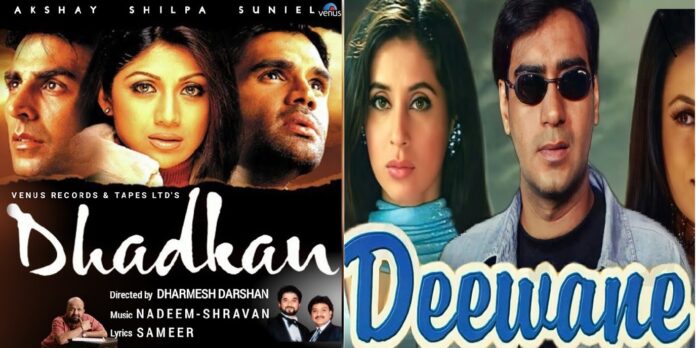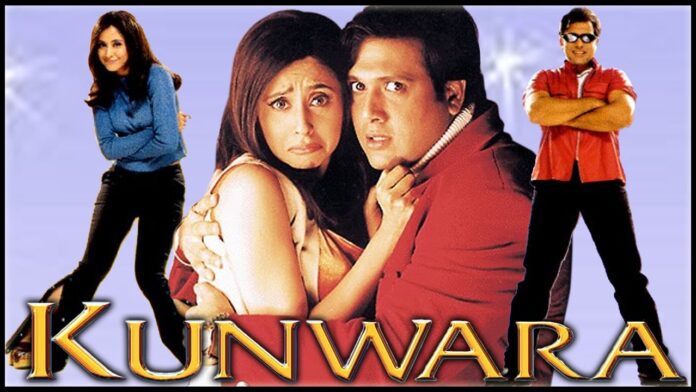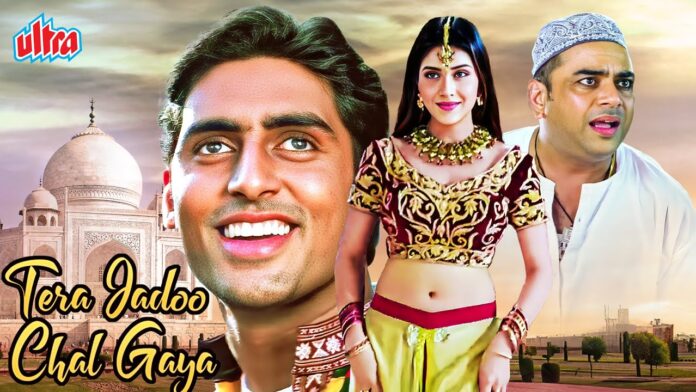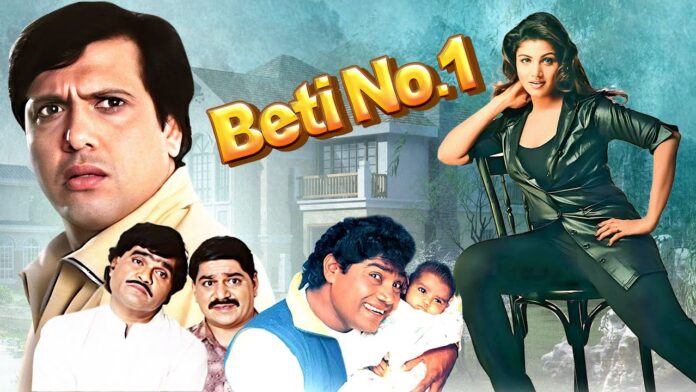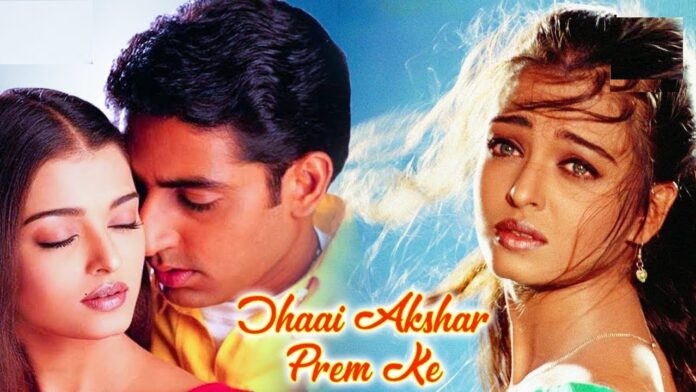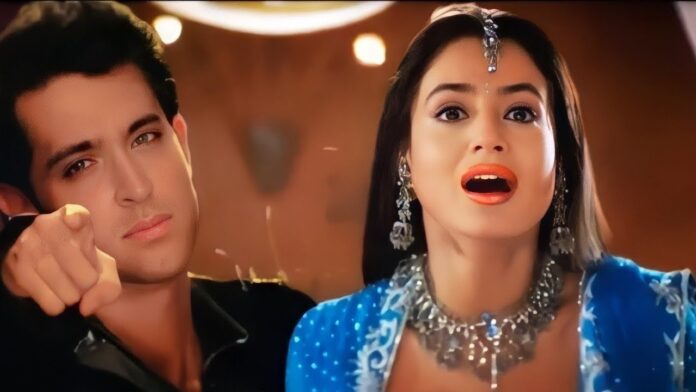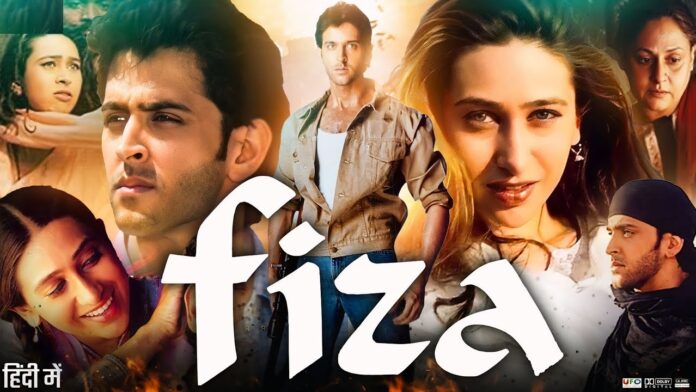DHADKAN
Venus Records & Tapes Ltd.’s Dhadkan is a love triangle with misplaced emotions. A poor bastard child (Sunil Shetty) loves a rich girl (Shilpa Shetty) whose father forces her to marry a wealthy businessman (Akshay Kumar). Three years after her marriage, her ex-flame comes into her life once again, in a bid to win her over. The only difference is that this time, he is a multi-millionaire. Not able to get her, his frustration gets the better of him and he directs his ire at her husband who is rendered homeless in a day. Hell hath no fury like a man scorned — or, rather, spurned! Unable to come to terms with reality, he is ultimately pacified by the girl’s husband who makes him see reason and take life as it comes.
The film’s screenplay (Naseem Mukri and Raj Sinha) and dialogues (Naseem Mukri and Dharmesh Darshan) are weak and, sometimes, even erroneous. Characterisations of the two heroes are anything but convincing. The husband’s Gandhian nature will not go down well with the audience for two reasons — one, such human beings are a rare breed in today’s times (and if one wanted to make it a believable character, one should have done it with much, much more conviction); secondly, the hero who plays the husband — Akshay Kumar — has an action image among the public and his Gandhian character looks completely out of synch. The other hero’s characterisation is faulty, to say the least. For, although he is not shown as a villain in the film, he does things befitting a villain — following his beloved even three years after she has been married to another guy; playing dirty with her husband to avenge his rejection by the girl while sparing her father who is the actual ‘villain’. The madness in his love for the girl after her marriage reminds of Yash Chopra’s Darr but in that film, Shah Rukh Khan was rightly shown as a villain who is murdered in the end, whereas in this film, Sunil Shetty remains a hero till the very end. Sorry, his deeds are anything but heroic! For that matter, Akshay Kumar also does not show heroism of the kind desired by the audience. So, there are two heroes but no heroism in that sense of the term. One gets the impression that the writers, wanted to be different, but in their quest to be different, they’ve done things wrong.
The scenes of the husband’s step-mother, step-brother and step-sister remind heavily of the director’s Raja Hindustani. Dialogues are good at places only. Another weak point is that there’s more gloom and less joy in the film — the girl is unhappy for a long time because she has to marry against her wish; later, she is sad because her ex-flame comes back into her life; the husband is sad because his family hates him; the bastard boy is unhappy because he loses his girlfriend. Climax is too tame and convenient; the ending is also predictable much before it comes.
Akshay Kumar does well according to his characterisation. Sunil Shetty also acts very ably. Shilpa Shetty does a fine job but she should have gone easy on her make-up. In fact, if Shilpa Shetty looks heavily made-up, the other heroine, Mahima Chaudhry, looks tired and lacks glamour. Mahima’s performance is good, though. Sharmila Tagore is over-dramatic. Kiran Kumar is alright. Sushma Seth is quite natural. Parmeet Sethi gives a good account of himself. Manjeet Kullar is also good. Neeraj Vora, Nilofer, Anjana Mumtaz, Kader Khan and Naseem Mukri lend ordinary support.
Dharmesh Darshan, having selected a difficult plot, has not been able to rectify the flawed screenplay, and his direction, consequently, provides little by way of an enjoyable drama. Even otherwise, the serious film holds appeal mainly for the class audience.
Nadeem Shravan’s music is one of the best things in the film. ‘Tum dil ki dhadkan mein’ and ‘Dil ne yeh kaha hai dil se’ are hit songs and are very melodious. ‘Dulhe ka sehra’, ‘Na na karte’ and ‘Aksar is duniya mein’ are also good numbers. W.B. Rao’s cinematography is the other brilliant aspect of the film. The camerawork and the picturesque locations on which the film is shot are fantastic. Background music (Surender Sodhi) is effective.
On the whole, Dhadkan is an insipid fare which fails to touch the heart and will, therefore, not be able to evoke audience appreciation.
Released on 11-8-2000 at Eros and 18 other cinemas of Bombay by Venus Records & Tapes Ltd. thru V.I.P. Enterprises. Publicity: excellent. Opening: good. …….Also released all over. Opening was dull in several places but very good in Calcutta and Nizam.
DEEWANE
S.P. Creations’ Deewane (UA) is about a CID inspector whose only passion in life is work. He loves his childhood girlfriend and she, too, is in love with him. The girl resents his devotion to work when it comes in the way of their romantic outings. By a turn of events, the officer slips into a coma and, in his place, comes his look-alike who is a criminal by profession. Planted by the commissioner of police in the CID officer’s place, this look-alike is attracted towards the officer’s girlfriend who is unaware of the impersonator. This look-alike, too, is passionate, but his passion is for the girl. In her interaction with him, the girl for the first time discovers what true love is. But all along, she is under the impression that the guy she is romancing is her old childhood-friend. All hell breaks loose in her life when, after her boyfriend comes out of the coma, she learns that she had been fascinated by the impersonator. Even as she and her buddy prepare for marriage, the look-alike tries to win her as she tries to shun him. But the realisation dawns upon her that she actually loves the impersonator. Misunderstandings are cleared in the end and while one guy sacrifices, the other gets the girl he loves.
Anees Bazmee’s story is quite interesting, but it has been ruined by a shoddy screenplay which seems to have been hurriedly written by Karan Razdan. There’s simply no thrill of a double role because, very often, the switching of roles between the two is revealed after an exciting incident has taken place rather than before it. Resultantly, the audience is not able to share in the excitement associated with trading places. So insipid is the drama that the viewer is not bothered about who of the two heroes the girl would ultimately marry. Such indifference and absence of a yearning of the heart of the audience for the principal characters is a dangerous sign in a love triangle. The romance looks feeble, at least from the girl’s side. The first half is too lengthy, repetitive and boring. Post-interval, the drama is better, but only very slightly. Dialogues are alright. While the climax is not incorrect, it does not gladden the viewers’ hearts as two important characters in the drama have to simultaneously sacrifice their loves.
Ajay Devgan gives a sincere performance in a double role. Although there is some action of Ajay, it is mainly gun fights rather than the enjoyable fist fights. Urmila Matondkar is reasonably good. Mahima Chaudhry impresses in emotional scenes. Johny Lever’s comedy is superb. Paresh Rawal entertains at a few places and so do Pramod Moutho and Tiku Talsania. Gulshan Grover has very little scope. Aasif Sheikh, Reema, Usha Bachani, Shivaji Satam, Padmini Kapila, Neha P., Mini Tabassum, Raju Mawani and the rest fill the bill.
Harry Baweja’s direction is ordinary and gets burdened by a poor script. Sanjeev Darshan’s music is very good. The title song, ‘Ae dil’, ‘Qayamat’, ‘Churao na dil’ and ‘Jab ishq da’ are excellently tuned. However, most of the song picturisatins do not match their hit music. Camerawork is fair. Action lacks thrill. Editing is loose. Special effects (CMM Studios, Peter Pereira and Nirmal Jani) are quite nice.
On the whole, Deewane is a boring and dull fare which will put its distributors to heavy losses.
Released on 11-8-2000 at Liberty and 21 other cinemas of Bombay thru Devgan Entertainment & Software Ltd. Publicity: good. Opening: fair. …….Also released all over. Opening was very poor almost everywhere (good in Nizam).
LATEST POSITION
The dull openings of both the major releases of this week have shocked many.
Har Dil Jo Pyar Karega dropped after 4 days at many places but has managed very good shares in 1st week. Is excellent in Bombay, Maharashtra and Nizam. 1st week Bombay 82,06,409 (98.03%) from 14 cinemas (9 on F.H.); Ahmedabad 32,49,245 from 10 cinemas, Padra 2,51,755, Vapi 6,28,571, Jamnagar 1,72,100, Adipur 1,66,690 (73.83%), Bhuj 1,56,699; Pune 19,77,262 from 5 cinemas (1 in matinee), Solapur 4,33,966 from 2 cinemas; Delhi 79,69,730 (79.72%) from 14 cinemas (2 on F.H.); Kanpur 6,30,559 from 2 cinemas, Lucknow 8,25,892 from 2 cinemas, Agra 3,85,000, Allahabad 2,64,377, Bareilly 1,72,054; Calcutta 30,30,993 from 15 cinemas (17 on F.H.); Nagpur 9,41,855 from 4 cinemas, Jabalpur (gross, 6 days) 2,55,105, Amravati 2,98,968, Raipur (5 days) 1,75,311, Durg 1,14,171, Jalgaon 2,00,946, Gondia (gross, 29 shows) 1,42,641, Wardha 1,30,746, Yavatmal 1,86,441; Indore 2,62,254 (4 on F.H.), Bhopal 2,14,000 (1 unrecd.); Jaipur 12,88,643 (52.11%) from 5 cinemas, Ajmer (24 shows, gross) 2,52,856; Hyderabad (gross) 59,38,533 from 18 cinemas, share 35 lakh; Aurangabad (gross) 9,54,306 from 4 cinemas; Vijayawada (gross) 3,10,425, Guntur (gross) 96,535.
Justice Chowdhary 1st week Bombay 6,83,603 (46.53%) from 5 cinemas (6 on F.H.); Ahmedabad 94,950 from 2 cinemas; Pune 1,48,887 from 2 cinemas; Delhi 5,11,773 (19.65%) from 5 cinemas; Allahabad 33,990; Nagpur 98,743 from 2 cinemas, Raipur (5 days) 29,711; Jaipur (29 shows) 74,135 (25%); Hyderabad (gross) 1,80,702 from 3 cinemas.
…………
NEW CINEMA AT DAHISAR
Movie Gem, a new cinema, opened on 11th August at Dahisar, a distant suburb of Bombay, with Deewane.
‘REFUGEE’ TAX-FREE IN M.P.
J.P. Dutta’s Refugee has been granted exemption from payment of entertainment tax in the state of Madhya Pradesh for a period of six months with a maximum limit of 4 weeks in every centre, including shifting. The tax exemption came into effect from 9th August.
VIKAS VASWANI DEAD
Producer Vikas Vaswani died due to heart attack in the early morning hours of 11th August at his residence in Bombay. He was 58 and a bachelor. He will be cremated today (12th).
Vikas was a partner with producer Jagdish Sharma. The two had jointly produced Maa Kasam (Mithun Chakraborty and Amjad Khan). Their film, Kasam, starring Sunny Deol, is under-production.
DIRECTOR SATPAL NO MORE
Director Satpal (Sharma) passed away on 10th August at Cooper Hospital, Bombay, where he was being treated for jaundice. He was 62 and a bachelor. He was cremated on 11th August.
Satpal started his life as an office boy in a film production company. His struggle led him to Bhappi Sonie under whom he worked as an assistant director. He turned an independent director with Bhola Bhala (starring Rajesh Khanna, Rekha, Moushumi Chatterji) which was followed by Chunaoti (Feroz Khan, Neetu Singh) and Do Waqt Ki Roti. He was later associated with K.C. Bokadia. Satpal used to be very close to Dharmendra and Feroz Khan.
400 ILLEGAL VIDEO CDs SEIZED IN DELHI
At the instance of Feature Films Copyright and its staff, the Delhi police recently raided the shop of one Captain Video at Old Lajpat Rai Market and seized 400 pirated video CDs of various films including Jungle, Hum Aapke Dil Mein Rehte Hain, Hera Pheri and Kya Kehna!. One Ajay Gupta was arrested. The total value of the goods seized is estimated at Rs. 40,000.
NEW CINEMA OPENS AT BURHANPUR
A new cinema, Ankita, opened on 11th August at Burhanpur. Dhadkan is the opening attraction.
TWO BOMBAY DISTRIBUTORS ARRESTED
Naaz building in Bombay was rocked by two arrests in the last eight days. Vinod Kakkar of Veekay Enterprises, Bombay was arrested and sent to a jail at Panvel (near Bombay) on 5th August. On 9th, Devendra Shah was arrested alongwith his young son. The three were granted bail on 11th.
The arrests were made following criminal complaints by Thane sub-distributor Suresh Dave. In the case of Vinodbhai, the Thane sub-distributor alleged that he had double-sold the Thane sub-distribution rights of Shikari to him (Dave) is well as to another party (Ashok Ranglani). Devendra Shah is alleged to be owing huge monies to Dave in the account of Border which he (Shah) distributed in Gujarat and in the distribution of which Dave was a partner with Devendra Shah. Dave alleged that despite the elapse of three years, Devendra Shah was not paying him his share of profits.
KARNATAKA INDUSTRY IN A PREDICAMENT
The notorious Veerappan, while demanding a ransom of Rs. 50 crore for the release of Kannada matinee idol Dr. Rajkumar, has also held the Karnataka film and TV industry to ransom. Since the day the most venerated star was abducted, the Karnataka industry has rendered itself into a state of impasse due to which the financial loss for the film industry has amounted to crores.
ANNOUNCEMENT & LAUNCHING
Anil Kapoor, Satish Kaushik Launch Production Company
Anil Kapoor and Satish Kaushik launched Kapoor & Kaushik Entertainment P. Ltd. with their first production venture, Badhai Ho Badhai, on Aug. 9. A launching pooja was held at Audeus and it was followed by a song recording at Sahara. The song was penned by Javed Akhtar and composed by Anu Malik. The recording is being followed by a 3-day shooting spell in Bombay.
The film stars Anil Kapoor, Karisma Kapoor and Amisha Patel, and it is being directed by Satish Kaushik. Mukta Arts presents it. It will be completed in March 2001 and released in June 2001.
Satish Kaushik will also be directing a film to be produced by Mukta Arts. Its cast is being finalised and it will start shortly.
YOU ASKED IT
Is someone planning a film on Veerappan?
– Veerappan would give anything to a maker to make a film on him.
Why do Indian filmmakers not break away from the mould and make a film that does not centre around the hero and heroine?
– Rajkumar Santoshi tried it in CHINA GATE which did not run. But that does not mean, such films will never succeed. A gutsy director must try again.
Do stage shows help in popularising stars’ images?
– Besides popularising the stars, they fill star-pockets too!
3-E
Education-Entertainment-Enlightenment
Kaun Karega First Move?
There is not an iota of doubt that the Kaun Banega Crorepati game show has become a national craze among TV viewers. Host Amitabh Bachchan’s “positive?”, “sure?” and “confident?” have become catch-phrases even among mundane conversations between friends. These three questions have also spawned a number of jokes. The latest one doing the rounds among friends’ circles is the following:
Husband: Can we go out for a romantic dinner tonight?
Wife: Oh no, not tonight.
Husband: Are you sure? ….Positive? ….Confident?
Wife: Yes, sure, positive, confident.
Husband: In that case, can I phone a (girl)friend?
Now, a suggestion from our side:
How about incorporating KBC-oriented jokes in a film which is slated for an early release — say, within six months? That would have the germs of becoming a highlight comedy!
For example, a character in a film could be shown as a KBC fan who only speaks in the style of Amitabh Bachchan in the game show. A lot of jokes could be ‘invented’ around the KBC show. Somebody like Govinda or Johny Lever would be able to carry it off brilliantly. Come on, producers and directors, the first one could hit it off!
P.S.: A word of caution, here. David Dhawan seems to have liked our suggestion (we told him two days back) and is very likely going to use the KBC host take-off in Jeetendra’s film which he is directing.
INFORMATION MEETS
“We should first be convinced that whatever we have made is at least good enough. And this applies whether we work with Mr. Yash Chopra, Mr. Raj Kanwar or Mr. Karan Johar.”
– JATIN (Jatin Lalit)
GAJAA
They are soft-spoken and cool unlike their music which comprises hot hits dipped in melody. They are not known to be aggressive or pushy to market their creativity. And neither do they believe in blowing their own trumpets or beating their own drums. Or even raking up controversies to grab publicity for themselves. Jatin Pandit and Lalit Pandit have slowly but steadily created a prime place for their music in the Hall of Fame. Today, they are firing on all cylinders. Or, shall we say, recording on all tracks.
Starting with Yaara Dildaara, and followed by Jo Jeeta Wohi Sikander, Khiladi, Raju Ban Gaya Gentleman, Kabhi Haan Kabhi Naa, Dilwale Dulhania Le Jayenge, Khamoshi, Yes Boss, Pyaar Kiya To Darna Kya, Ghulam, Pyaar To Hona Hi Tha, Kuch Kuch Hota Hai and Phir Bhi Dil Hai Hindustani, this Pandit duo has come a long way indeed!
Their forthcoming films include Mohabbatein, Kabhi Khushi Kabhi Gham, Dhai Akshar Prem Ke and Raju Chacha.
We now ‘record’ Jatin Lalit in Jatin’s words. Over to Jatin:
Music has become a big market today. It is more than a major territory. But the status of music directors hasn’t grown proportionately. What would you say to that?
– That’s a fact, a very sad fact. If the music directors are united, a lot of benefits can be got.
Will they ever be united?
– We really don’t know. Being in the rat race and indulging in cut-throat competition have become second nature to the music composers. Even those who have been in business for years, want to carry on, thus blocking the prospects of the younger crop coming up. The seniors want more and more and more….
Maybe, that’s because the seniors do not earn so much as to retire.
– That’s also true. The only way to face such competition is one’s work. That’s why we work hard, day in and day out. After all, quality of work counts. But how many producers care for good music? Sometimes, a producer approves our tunes, but if someone comes up with a ‘tempting’ offer, the producer goes there. So, unless and until we start the recording, nothing is confirmed. There’s many a slip between the producer’s approval and recording!
Has it happened with you?
– Yes, a number of times!
And don’t you indulge in under-cutting?
– Honestly, never! Today, we have enough work to keep ourselves creatively engaged. And we are quite content too. If we know that a certain music director has already had a meeting with a certain producer, we don’t approach that producer. Grabbing someone else’s film is unethical. I consider it a sin. As it is, we have proved our music’s worth. An international organisation has adjudged Sholay, Dilwale Dulhania Le Jayenge and Kuch Kuch Hota Hai as the best Indian films. We are proud to be associated with two of the best ones.
It is believed that frustrations and humiliations bring the best out of creative people. What has been your experience?
– Frustrations and humiliations can lead one to a little bit of hard work. But is only hard work enough? One has got to have creativity within oneself. As for the frustration part of your question, we were never frustrated despite people playing games with us. We are a soft-spoken duo which never displayed any aggressiveness where bagging assignments was concerned.
But today, everyone is out to make a fast buck. Haven’t you heard, while in Rome, do as the Romans do?!
– But Rome was not built in a day! We have been around for the last 10 years and we have been working at our own pace. Even at the risk of sounding immodest, we can claim that we have consistently provided quality music. Our music has worked! And that’s why we get work without indulging in any kind of hard-sell. We come from a gharana that is devoted to music. My forefathers were into classical music. My grandfather, Motiram-ji, and his brother, Jyotiram-ji, were court singers and composers of classical music. Our father, Pandit Pratap Narayan, our uncle, Pandit Jasraj, our sisters, Sulakshana and Vijayeta, are singers. We are from the Mewathi gharana. Even Lalit and myself sang songs under R.D. Burman.
But your gharana was involved in classical music. What made you branch out into film music?
– See, we all study in the same schools, we learn the same lessons, yet we branch out in different directions. To start with, a music director has to know about classical music before he branches out in any field of music, whether singing or playing music or film music direction. Tomorrow, maybe, my son might become a music engineer.
What’s your style of working — vis-à-vis lyricists, vis-à-vis directors and producers, and between yourselves?
– We both go into detailing about the subject, the situation and the character of the actor on whom the song is to be picturised. This kind of detailing helps us to co-ordinate between ourselves, our producers and our directors. It’s as simple as that. We don’t just ‘print’ songs! Every tune we make is nurtured like our own baby, whoever the producer or director. After all, music is what has to please one’s ears. We should first be convinced that whatever we have made is at least good enough. And this applies whether we work with Mr. Yash Chopra, Mr. Raj Kanwar or Mr. Karan Johar. What is sweet music to one person’s ears is sweet music to others’ ears too. It is always ideal to work with producers who understand the worth of good music.
But do you think, people devote so much time for detailing, etc.
– Time is an important factor. It is not every time that you come up with good music. Even if a producer wants something fast, we do our best. It might work, it might not. A good melody takes a good time coming.
I will give you an example of a film called Yeh Hai Bambai Meri Jaan. Though the film flopped, its one song, Mera chand mujhe aaya hai nazar, proved a super-hit.
Just the other day, Mr. Ramesh Taurani wrote to us stating that he was proud to be associated with Sarfarosh. He also acknowledged that the music of Ghulam and Jab Pyaar Kisise Hota Hai had sold like hotcakes and was selling even today.
Alright, the music is selling like hotcakes, but did you get a slice of the cake?
– Nobody shares the cake!
Why don’t you put a clause in your agreements for a share in the producers’ income from the music sales?
– One shouldn’t impose oneself since we all agree to work for a price. However, Shah Rukh and Yash Johar gave us a percentage from the music’s earnings for Phir Bhi Dil Hai Hindustani and Kuch Kuch Hota Hai.
There have been music directors who’ve scored music for many films in a few years, and given really good music. Then suddenly, they go out of form. Why does this happen?
– If you just rush and run, the ultimate result is rust and ruin. I won’t like to sermonise here. You know what happens when a candle is burnt at both the ends!
Most of the times, your music sounds R.D. Burman-ish.
– Yes, we are influenced by Pancham-da. He is an inspiration to us. We have also rendered songs under his baton when we were kids. That’s why Pancham-da chhaap comes out in our songs, at times!
What do you do when you are stuck up for a good tune?
– That will be letting out a secret! Anyway, I will definitely tell you what I do. I sing aloud old film songs tuned by the greats of the good old days — Shanker Jaikishen, S.D. Burman, R.D. Burman, Madan Mohan and O.P. Nayyar. And I sing them continuously for a couple of days and then come into my own. I consider this exercise as a kind of deep meditation.
Which of the old songs come to your mind at such times?
– Many.
Your five favourites?
– Madan Mohan’s Zara si aahat hoti hai to dil sochta hai (Haqeeqat), Laxmikant Pyarelal’s Suno sajana papihe ne (Aaye Din Bahar Ke), Shanker Jaikishen’s Zindagi ek safar hai suhana (Andaz), S.D. Burman’s Hum bekhudi mein tumko pukare chale gaye (Kala Pani), and Roshan’s Jo vaada kiya woh nibhana padega (Taj Mahal).
I remember a duo called Mandhir-Jatin. Are you the same Jatin?
– Yes, I am the same Jatin. Mandhir is our elder brother. He is also with us. At times, we seek his help. Mandhir is a top rhythmist and he is very busy as a musician. Mandhir and I did only one film together, Dil Hi Dil Mein. Thereafter, I and Lalit formed a team.
Finally, what keeps the Jatin-Lalit team in top form?
– Combination of hard work and talent. And destiny, of course!





























